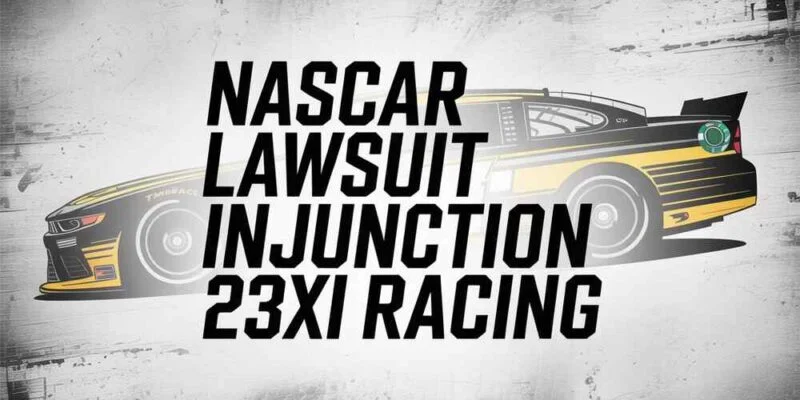The world of NASCAR is no stranger to speed, spectacle, and controversy. But in late 2024, the motorsport world was shaken not by an on-track collision, but by a legal standoff that could reshape how the business of stock car racing operates. At the center of the dispute stands 23XI Racing, the high-profile team co-owned by basketball legend Michael Jordan and veteran driver Denny Hamlin, in legal combat with the very organization that governs the sport: NASCAR. This is more than just a contract dispute—it’s a lawsuit that questions the fairness, structure, and future of NASCAR’s charter system.
The Backstory: What Led to the Lawsuit
Since its inception in 2020, 23XI Racing has carved out a name in NASCAR’s Cup Series, quickly gaining fans and podium finishes. The team, driven by vision and deep pockets, sought to expand its influence by acquiring more charters—those highly valuable licenses that guarantee a team a spot in every race and a share in the revenue pool. But herein lies the rub: NASCAR’s charter system, introduced in 2016, has been increasingly criticized for being exclusive and for limiting new competition.
Alongside Front Row Motorsports (FRM), 23XI Racing filed an antitrust lawsuit in October 2024. The core allegation? That NASCAR’s control over charters is monopolistic, creating insurmountable barriers for expansion and new entrants. The lawsuit painted a picture of a closed circle, with NASCAR allegedly acting as gatekeeper and enforcer in a marketplace skewed against team growth.
Inside the Lawsuit: Allegations and Legal Claims
The case filed in federal court accuses NASCAR of violating U.S. antitrust laws by engaging in anti-competitive practices. Specifically, the complaint argues that NASCAR restricts how charters are issued and transferred, manipulating supply and inflating prices artificially. The plaintiffs argue this system creates an uneven playing field that benefits the established elite and punishes emerging competitors.
23XI Racing and FRM asked the court to intervene and provide immediate relief in the form of a preliminary injunction. Their concern? Without judicial intervention, their ability to participate as full charter-holding teams in the 2025 season would be jeopardized, potentially causing financial and reputational harm.
The Injunction: What It Means and Why It Matters
In December 2024, a significant moment arrived: U.S. District Judge Kenneth Bell granted a preliminary injunction allowing 23XI and FRM to move forward with acquiring charters from Stewart-Haas Racing. This decision gave both teams the green light to compete in 2025 without restrictions imposed by the existing charter system.
The injunction was a temporary victory but not a final verdict. It permitted expansion for 23XI and FRM but also intensified the scrutiny surrounding NASCAR’s policies. For many observers, it marked a rare moment of judicial intervention in professional motorsports, where team owners often have little recourse against the governing body.
NASCAR’s Counterattack
NASCAR’s response was swift and sharp. The organization filed a countersuit against 23XI Racing, Front Row Motorsports, and Curtis Polk—Michael Jordan’s longtime business advisor. The countersuit accused them of forming an “illegal cartel” to pressure NASCAR into more favorable charter negotiations.
This legal maneuver highlighted NASCAR’s commitment to defending the current structure. NASCAR emphasized that the charter system brings financial security and consistent race grids, arguing that it’s vital for business sustainability in a volatile sport. According to NASCAR, dismantling the system could usher in instability that threatens the broader health of the series.
Benefits and Strategic Moves by 23XI Racing
For 23XI Racing, the injunction brought substantial benefits. The ability to secure charters directly led to a major strategic play: the acquisition of charters from Stewart-Haas Racing. This move will allow the team to run three full-time cars in 2025, marking a significant expansion in its operations and visibility.
With guaranteed entry into each race, 23XI now enjoys stronger leverage with sponsors, improved financial planning, and better recruitment opportunities. The team has already attracted major partners, including Monster Energy and McDonald’s, looking to align with a dynamic, diverse team that resonates with a modern audience.
Appeals and Courtroom Developments
While the injunction stood as a temporary win, NASCAR swiftly appealed the ruling. In May 2025, the Fourth Circuit Court of Appeals reviewed the case and expressed skepticism about allowing teams to benefit from a system they were simultaneously attempting to dismantle. Judges questioned whether it was fair to grant access to a disputed structure, suggesting the injunction could be overturned before a final ruling.
If the appeals court sides with NASCAR, the current plans of 23XI and FRM could be disrupted mid-season. If the injunction is upheld, it may open the doors for other teams to seek legal remedies, potentially unleashing a flood of similar challenges.
The Bigger Picture: What This Means for NASCAR
The implications of this legal battle go far beyond the fate of 23XI Racing. At the heart of the debate lies a fundamental question: who controls access to the grid in professional motorsports? If the courts side with the teams, it could lead to a dismantling or drastic restructuring of the charter system, promoting more open competition but also risking economic volatility.
For NASCAR, losing this legal battle could weaken its central authority and force a more collaborative model with team owners. On the other hand, a win would reaffirm its right to regulate how teams enter, expand, and participate in the sport. Either way, the trial set for December 2025 will be a defining moment in the history of NASCAR governance.
Industry Reactions and Fan Perspectives
The reaction within the industry has been mixed. Some team owners sympathize with 23XI and FRM, especially those seeking growth opportunities. Others fear that a successful lawsuit could destabilize the delicate business balance NASCAR has worked to maintain.
Fans, too, are divided. On platforms like Reddit and Twitter, some celebrate 23XI as challengers to the old guard, fighting for fairness and modernization. Others worry that too much legal interference could dilute the competitive integrity and heritage of the sport.
Conclusion: What Lies Ahead for 23XI and NASCAR
As the motorsport world awaits the outcome of the December 2025 trial, one thing is clear: this case is about more than just charters and contracts. It’s about control, access, and the direction of NASCAR in an era where business and sport are more intertwined than ever.
23XI Racing, backed by one of the most iconic athletes in history, has made its move not just on the track but in the courtroom. Whether this gamble leads to reform or retrenchment remains to be seen. But whatever the outcome, the lawsuit has already sparked a critical conversation that could steer the sport into a new era of transparency and transformation.
READ MORE : The 23andMe Lawsuit Explained: Privacy, Genetics, and Legal Consequences
FAQs
What is the NASCAR lawsuit involving 23XI Racing about?
The lawsuit centers on allegations by 23XI Racing and Front Row Motorsports that NASCAR’s charter system violates antitrust laws. The teams argue it unfairly restricts competition and inflates charter costs.
Why did 23XI Racing file for an injunction?
23XI Racing sought a preliminary injunction to ensure their ability to participate as a chartered team in the 2025 season while the lawsuit proceeds. The court granted it, allowing them to acquire charters and expand.
How did NASCAR respond to the lawsuit?
NASCAR filed a countersuit, accusing 23XI Racing and its associates of forming an “illegal cartel” to manipulate negotiations. The organization defended its charter system as essential for financial and competitive balance.
What does this lawsuit mean for other NASCAR teams?
If the lawsuit succeeds, it could set a precedent for other teams to challenge NASCAR’s control, potentially leading to major reforms in how charters are issued and managed across the sport.
When will the final court decision be made?
The full trial is scheduled for December 2025. Until then, the case continues to unfold through appeals and courtroom developments.




